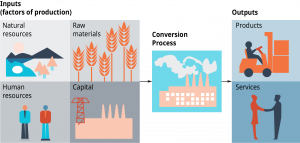13.1 – Production and Operations Management—An Overview
- Why is production and operations management important in both manufacturing and service firms?
Production, the creation of products and services, is an essential function in every firm. Production turns inputs, such as natural resources, raw materials, human resources, and capital, into outputs, which are products and services. This process is shown in Exhibit 13.1. Managing this conversion process is the role of operations management.
The goal of customer satisfaction is an important part of effective production and operations. In the past, the manufacturing function in most companies was inwardly focused. Manufacturing had little contact with customers and didn’t always understand their needs and desires. In the 1980s, many U.S. industries, such as automotive, steel, and electronics, lost customers to foreign competitors because their production systems could not provide the quality customers demanded. As a result, today most American companies, both large and small, consider a focus on quality to be a central component of effective operations management.

Stronger links between marketing and manufacturing also encourage production managers to be more outwardly focused and to consider decisions in light of their effect on customer satisfaction. Service companies find that making operating decisions with customer satisfaction in mind can be a competitive advantage.
Operations managers, the people charged with managing and supervising the conversion process, play a vital role in today’s firm. They control about three-fourths of a firm’s assets, including inventories, wages, and benefits. They also work closely with other major divisions of the firm, such as marketing, finance, accounting, and human resources, to ensure that the firm produces its goods profitably and satisfies its customers. Marketing personnel help them decide which products to make or which services to offer. Accounting and human resources help them face the challenge of combining people and resources to produce high-quality goods on time and at reasonable cost. They are involved in the development and design of goods and determine what production processes will be most effective.
Production and operations management involve three main types of decisions, typically made at three different stages:
- Production planning. The first decisions facing operations managers come at the planning stage. At this stage, managers decide where, when, and how production will occur. They determine site locations and obtain the necessary resources.
- Production control. At this stage, the decision-making process focuses on controlling quality and costs, scheduling, and the actual day-to-day operations of running a factory or service facility.
- Improving production and operations. The final stage of operations management focuses on developing more efficient methods of producing the firm’s goods or services.
All three decisions are ongoing and may occur simultaneously. In the following sections, we will take a closer look at the decisions and considerations firms face in each stage of production and operations management.
Gearing Up: Production Planning
An important part of operations management is production planning. Production planning allows the firm to consider the competitive environment and its own strategic goals to find the best production methods. Good production planning has to balance goals that may conflict, such as providing high-quality service while keeping operating costs low, or keeping profits high while maintaining adequate inventories of finished products. Sometimes accomplishing all these goals is difficult.
Production planning involves three phases. Long-term planning has a time frame of three to five years. It focuses on which goods to produce, how many to produce, and where they should be produced. Medium-term planning decisions cover about two years. They concern the layout of factory or service facilities, where and how to obtain the resources needed for production, and labor issues. Short-term planning, within a one-year time frame, converts these broader goals into specific production plans and materials management strategies.
Four important decisions must be made in production planning. They involve the type of production process that will be used, site selection, facility layout, and resource planning.
CONCEPT CHECK
- What are the three types of decisions that must be made in production planning?
- What are the three phases of production planning?
Source contents: Principles of Management and Organizational Behavior. Please visit OpenStax for more details: https://openstax.org/subjects/view-all

